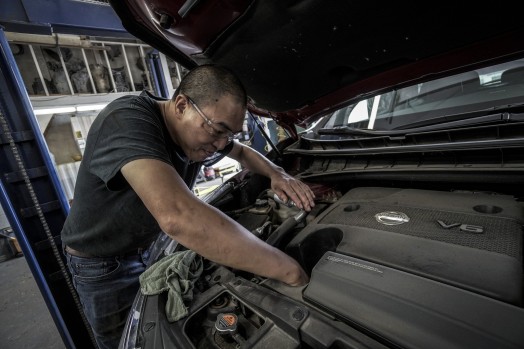When it comes to car maintenance, it is critical to monitor the condition of engine oil, which is your engine’s lifeblood. When an oil change occurs faster than expected, it can be unsettling for drivers and raise questions about their car’s health. This article examines the several variables that lead to a faster drop in oil life. We cover topics ranging from driving behaviors and environmental factors to vehicle-specific problems. It is not just interesting to learn about the complexities of this phenomenon; knowing them can help you maintain the longevity and best performance of your car.
Brief explanation of the importance of engine oil in vehicle performance:
An engine’s ability to run smoothly and effectively is dependent on its engine oil. Its significance can be distilled into a few main points:
- Lubrication: By acting as a barrier between the engine’s moving parts, engine oil lowers friction and lessens wear and tear. The longevity and correct operation of the engine parts depend on this lubricant.
- Heat Dissipation: Engine oil aids in the dissipation of heat produced during combustion. It keeps the engine running within its ideal temperature range by absorbing and transferring heat away from important engine components.
- Sealing and Cleaning: To avoid leaks and preserve the ideal compression, engine oil helps to seal the spaces between the cylinder walls and the pistons. It also removes deposits and pollutants, keeping the engine clean and avoiding the buildup of sludge and debris.
- Corrosion Protection: Additives in engine oil prevent rust and corrosion on metal surfaces. This is very crucial for the engine’s longevity, especially in areas with diverse temperatures and weather patterns.
- Enhanced Fuel Efficiency: Fuel efficiency is increased when engine oil facilitates proper lubrication and decreased friction. An engine with proper lubrication runs more smoothly and uses less gasoline and energy to run at its best.
- Noise Reduction: By serving as a cushion between moving elements, engine oil lowers vibration and noise. This adds to a quieter and more pleasurable driving experience in addition to improving driver comfort.
- Extended Engine Life: Frequent maintenance and oil changes guarantee the engine oil keeps working effectively for all its intended purposes. Consequently, this enhances the engine’s overall durability and dependability of the car.

Understanding Engine Oil Life:
Knowing how long engine oil can efficiently carry out its specified tasks in a vehicle’s engine is essential to understanding engine oil life. Oil Life Monitoring Systems (OLMS), installed in modern cars, assess the engine oil’s remaining usable life by combining several criteria. These are important things to remember:
Oil Life Monitoring Systems (OLMS): Many contemporary cars are equipped with OLMS technology, which determines how much oil is left in the car based on several factors. To estimate the oil degradation over time, these systems consider variables including driving patterns, temperature, RPM (revolutions per minute), and engine operating parameters.:
Oil Life Percentage: A vehicle’s dashboard or infotainment system usually displays the oil life % as provided by the OLMS. The engine oil’s effective life as a percentage is represented here. A recommended oil change is indicated when the percentage falls to a specific level, usually between 15 and 20%, as this signifies the oil’s nearing the end of its useful life.
Factors Influencing Oil Life:
- Operating Conditions: Extremes in temperature, short excursions, and stop-and-go driving are some of the factors that might hasten the deterioration of oil.
- Driving Habits: Faster oil breakdown can be caused by aggressive driving, heavy towing, and high speeds.
- Oil Type and Quality: The oil’s ability to retain its qualities over time can be influenced by the kind and caliber of oil used, as well as the oil filter.
- Regular Maintenance: Even if OLMS offers a useful guideline, it is crucial to not rely only on it. To guarantee that the engine oil is continuously at its ideal level, routine maintenance—which includes planned oil changes—is essential.
- Oil Change Intervals: Vehicle manufacturers recommend different oil change intervals based on many criteria such as driving conditions and oil type. Adhering to the manufacturer’s instructions as stated in the owner’s manual is crucial.
- Oil Analysis: Oil analysis services are available for anyone looking for a more accurate understanding of the state of their engine oil. For these services, an oil sample is sent to a laboratory for analysis, yielding comprehensive data on the oil’s composition and any indications of contamination or wear particles.
Common Causes of Rapid Oil Life Decrease:
Many factors that hasten the oil’s degradation and lessen its ability to lubricate and protect the engine can be blamed for the sharp decline in engine oil life. These are a few typical reasons:
Inadequate Maintenance Practices:
- Irregular Oil Changes: Contaminants can build up and oil performance can suffer if prescribed oil change intervals are not followed.
- Using Subpar Oil Filters: Impurities can circulate in the engine and cause oil degradation if improperly installed or low-quality oil filters are unable to be removed completely.
Extreme Driving Conditions:
- Stop-and-Go Traffic: Urban traffic’s frequent starts and stops can put more strain on engines and hasten the deterioration of oil.
- Short Trips: Short excursions may prevent engines from reaching the ideal operating temperatures, which can lead to moisture buildup and decreased oil effectiveness.
- Heavy Towing or Hauling: Faster oil deterioration is a result of higher engine strain in vehicles utilized for towing or hauling big weights.
Engine Issues:
- Leaks: Oil leaks may cause an oil leak, which lowers the lubricant’s total volume and effectiveness.
- Overheating: Overheated engines have the potential to accelerate the breakdown and viscosity loss of oil, hence impairing its effectiveness in shielding engine components.
- Contamination: External impurities can lower the oil’s quality and shorten its life, such as dust, grime, or coolant leakage.
Low-Quality or Incorrect Oil:
- Using the Wrong Oil Grade: Increased friction and faster wear might result from using oil that is not the right viscosity or standard for the car.
- Using Low-Quality Oil: Selecting non-synthetic or low-quality oils may cause them to deteriorate more quickly and perform less well under pressure.
Environmental Factors:
- Extreme Temperatures: Extreme heat or cold can have an impact on the oil’s capacity to retain its protective qualities and viscosity.
Poor Driving Habits:
- Aggressive Driving: Steady acceleration, quick driving, and hard braking can put an engine under more strain and hasten the breakdown of oil.

The Impact of Neglected Oil Maintenance:
The engine and general performance of a car can be significantly harmed by neglecting oil changes. The following are some major effects of ignoring maintenance concerns connected to oil:
Increased Friction and Wear:
- Lack of Lubrication: The lubricating qualities of the oil deteriorate without routine oil changes, increasing friction between moving engine parts.
- Accelerated Wear and Tear: Friction increases the rate of wear and tear on important engine components such as camshafts, bearings, and pistons.
Reduced Engine Efficiency:
- Impaired Heat Dissipation: Older and deteriorated oil may raise operating temperatures because it cannot disperse heat from the engine as well.
- Reduced Fuel Efficiency: Fuel efficiency can be reduced, and fuel consumption can rise because of inefficient heat dissipation and increased friction.
Formation of Engine Deposits and Sludge:
- Contaminant Accumulation: Engine deposits and sludge can develop because of pollutants, dirt, and combustion byproducts building up in neglected oil over time.
- Restricted Oil Passages: Sludge and deposits from engines can clog oil passageways, limiting the flow and reducing the oil’s ability to lubricate and safeguard the engine.
Increased Risk of Engine Failure:
- Component Damage: Engine components are more vulnerable to harm while operating continuously with deteriorated oil, which raises the possibility of catastrophic engine failure.
- Severe Engine Damage: Neglected oil changes can, in severe circumstances, cause irreversible damage to engine parts, requiring expensive repairs or an engine replacement.
Higher Maintenance Costs:
- Major Repairs: Higher repair costs result from the need for significant repairs or component replacements to address engine problems brought on by poor oil maintenance.
- Reduced Engine Lifespan: The engine’s total life may be reduced, necessitating more expensive and frequent repairs or an early replacement.
Environmental Impact:
- Increased Emissions: Because a badly maintained engine burns fuel more efficiently, it can emit more emissions and pollute the environment.
- Oil Leaks: When oil escapes due to poor maintenance, there could be environmental dangers if the oil contaminates the land or water.
Compromised Vehicle Resale Value:
- Diminished Performance: A car with a poorly maintained engine will perform worse overall, which will lower the car’s resale value.
- Potential Buyer Concerns: A car’s marketability may suffer if previous oil changes were neglected, making potential purchasers reluctant to buy it.
Tips for Extending Oil Life:
A. Regular Oil Changes and Maintenance:
Insist that the oil change intervals specified by the manufacturer be followed. Oil quality may be maintained, and its effective lifespan can be extended with regular maintenance, which includes scheduled oil changes.
B. Choosing the Right Oil for Your Vehicle:
Emphasize how important it is to use the prescribed oil viscosity and quality that comes from the car manufacturer. Longer oil life is a result of using the optimum oil, which guarantees adequate lubrication and wear protection.
C. Driving Habits Adjustments:
Encourage drivers to take up practices that protect engine health, like letting the engine run at its ideal temperature, avoiding prolonged idling, and smoothly accelerating and braking. These modifications can help the oil last longer and lessen engine strain.
Drivers can actively contribute to extending the life of their engine oil by following these suggestions. A longer and healthier engine oil lifespan can be achieved by choosing the right oil, following maintenance schedules consistently, and developing attentive driving practices.
Frequently asked questions:
Why is my oil life rapidly decreasing?
Certain variables, such as infrequent oil changes, harsh driving conditions, or engine problems like leaks or overheating, may be causing your oil life to drastically decrease.
Is 10% oil life acceptable?
10% oil life is acceptable, however, for the best engine efficiency and lifespan, think about arranging an oil change as soon as possible.
How may my oil life be extended?
By following regular maintenance schedules, using high-quality oil, driving cautiously, and swiftly treating engine concerns, you may extend the life of your oil.
Why is the level of my oil dropping so quickly?
Rapidly declining oil levels can indicate possible problems that need to be looked at right once. These problems can be caused by leaks, overheating engines, or excessive oil use.
Conclusion:
In summary, keeping the engine oil in your car in good condition is a proactive commitment to the longevity and performance of your car. The lifespan of engine oil can be extended by drivers by being aware of and acting against factors like driving behaviors, environmental impacts, and vehicle-specific concerns. Achieving this aim will primarily depend on making routine oil changes, choosing the proper oil for your car, and practicing conscious driving. Being the lifeblood of your engine, an oil system that is kept up to date guarantees optimal performance, less wear and tear, and eventually, a smoother drive for your car in future miles.

